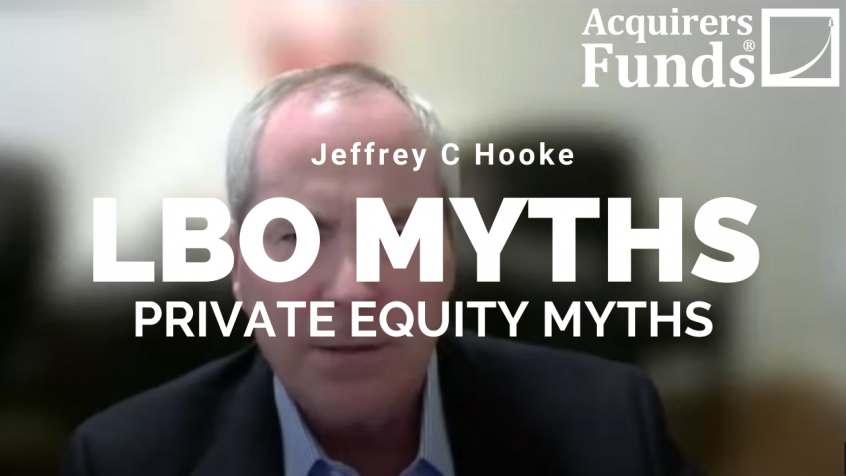During their recent interview on The Acquirers Podcast with Tobias, Jeffrey C. Hooke, finance professor and author of The Myth of Private Equity discussed The 3 Pillars Of Private Equity That Hurt Investors. Here’s an excerpt from the interview:
Jeffrey: Exactly. I don’t think I could summarize it any better. High pricing because of the competition. The high fees, and then the gamification as you pointed out. Now, each one of these could be rented at one with less funds out there that would take 10 years or so for the lower returns to sink in. I think eventually that will happen. As far as the fees go, I think the industry to its creditors have been incredibly resilient with keeping the fee structure as it is, even though, the returns have been mediocre. So, you got to give them credit.
They’ve fostered this aura of the fund managers all being geniuses. It’s remarkable. It’s going to take a while. The gamification returns, I just don’t see that being curtail without some government intervention or maybe some plaintiff’s lawsuit, one some big fund has lost money, some big pension plan. I lost money because they were messing with the true returns. That’s a possibility, but now it all be down the road. So, you got those three pillars that are sent to hurt investors in a negative way.
Tobias: Those criticisms of the industry have been around for a little while, and there’s Dan Rasmussen, who I’ve had on the podcast a few times, he does a private equity replication in public markets, and that’s his exact criticism that you can achieve the same returns without the illiquidity and without the fees. But presumably, these are so well known that it’s striking that people do continue to invest. So, my question, I guess, is, who are the investors in these funds, and why are they ignoring this evidence?
Jeffrey: Well Dan and I have talked about this. As you pointed out, he runs one of the few, if not the only, what I call buyout replication funds. I wrote an article with a professor, friend of mine about producing a buyout replication fund where you basically developed an algorithm for a company that’s similar to a buyout for– You just buy public companies that are similar and then leverage them in your portfolio. I remember talking to investment consultant service.
Hopefully, thinking about maybe introducing the idea institutions, he said, “Well, no one’s going to want to buy it.” Now, the institutions are going, “I’m going to pay you for that.” They would prefer to invest in LBO funds directly rather than have a public equity substitute. So, you might say, and I’m sure Dan is reflected on this as well. I talked to him in a year, so but you have to look at the mentality of the institutional managers working at these big pension funds, or these endowments, or these large nonprofit foundations. They’ve sunk probably a billion dollars into these buyouts.
Maybe more, despite the fact that it should be known to most of them that they’re not beating the public markets. They may keep their eyes close or wear blindfolds, who knows. But you got to look at it from their point of view. Let’s say you’re working in a big foundation as the investment manager. You’re probably making more money than the president of the foundation. You’re making $1 or $2 million a year, and to justify that you have to say, my job is so complicated. I can’t just buy stocks, and bonds, and trade publicly.
I have to do all this complicated stuff like private equity, hedge funds, commodities, real estate, private funds, and so on. So, it has to be very complicated. I have to have a staff, and I have to get a big salary and a bonus. So, they don’t tell the board of directors, well private equity, most of these other things don’t be a simple index. What’s their motivation? Their motivation is to preserve my career and advance my compensation. I have to get into all these exotic investments.
Now, you might say, “Well, wait a second, Jeff. Would the board of directors of the pension plan object that they’re not using these investment vehicles to beat the markets and say, “Do not beat the market? Wouldn’t there be some objection?” No, the directors of a lot of these big institutions, the trustees, or the board of directors, they’re not finance people. The you look at us typical state pension plan. They’re smart people. They might be heads of the unions, they might be political appointees.
Sometimes, they’re the treasurer, this day. But a lot of times, the majority of these people, I’d say most times, the majority of these directors do not have any financial training. So, when the investment managers get paid a million or $2 million a year at some pension plan or foundation walks in with a stack of papers, this detailing all these complicated investments that they have to make when they throw out all kinds of mathematical equations and terms like alpha, beta, and standard deviation R-squared. The director’s eyes glaze over. They soon fall into a smooth, numbing sleep. So, the answer to your question is that, yes, the institution’s keep buying, but it’s mainly for the managers to preserve compensation jobs and career.
You can find out more about Tobias’ podcast here – The Acquirers Podcast. You can also listen to the podcast on your favorite podcast platforms here:
For all the latest news and podcasts, join our free newsletter here.
Don’t forget to check out our FREE Large Cap 1000 – Stock Screener, here at The Acquirer’s Multiple:



